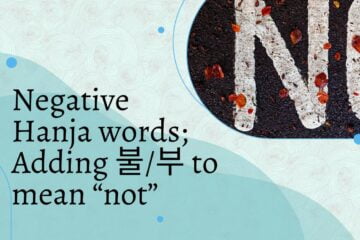Let’s get into some Sino-Korean with the 인 from 인간! 인간 is derived from the Chinese hanja character 人 which means person. This is one if the simplest characters with minimal strokes and it looks like a stick mans legs so it’s easy to remember!

사람 or 인간 Which Do I Use and When?
사람 is the most common way to say person and 인간 has a more formal feel to it. Think of it similar to 사람: person and 인간: human. In most sentences you wouldn’t say “that human is my teacher” you would more naturally say “that person is my teacher”. So you can use it more formal situations such as an educational setting eg. “humans are mammals”.
Is The Character 人 Used by Koreans?
Yes actually the hanja is used a bit in Korean media, news, signs and other places. For example you can see it used here in this poster design:
Anyway lets get into all the 인 words!
개인 person
개개인 each/every single person
개인적 private, personal (like something owned, or related to person)
개인주의 individualism
개인주의자 individualist
인간 human being
인간성 human nature
노인 elderly person
미인 a beautiful person
성인 adult
시인 poet
애인 lover
외국인 foreigner (lit. external country person)
(country)+인 Saying Your Nationality
한국인 Korean person
미국인 American
중국인 Chinese
악인 villain
범인 criminal
죄인 sinner
살인자 murderer
인구 population
인기 popularity
인생 life
인성 human nature
인정 humanity
인종 human race
인사 greetings
인사하다 to greet, say hello (conjugate verb)
Is Sino-Korean Important?
It’s not necessary but it can be useful! I put the original Chinese character in for anyone who would like it but you can basically ignore most characters and focus on the fact 인 in certain words has to do with people and humanity. Learn more about Sino-Korean in my dedicated post about it over here!




0 Comments